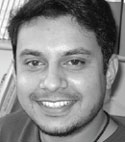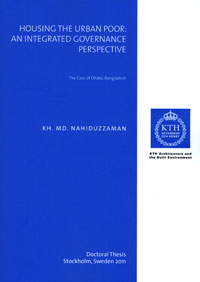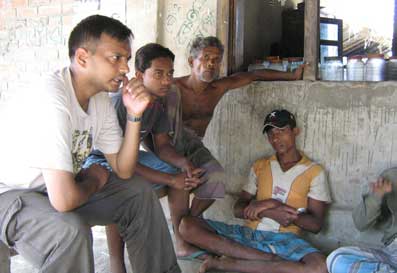SWEDISH SOUTH ASIAN STUDIES NETWORK
Division of Urban and Regional Studies, Department of Urban Planning and Environment; School of Architecture and the Built Environment (ABE), Royal Institute of Technology (KTH), Stockholm
Postal address: Avdelningen för urbana och regionala
studier, Institutionen för samhällsplanering och miljö, Skolan för arkitektur och samhällsbyggnad (ABE), KTH, SE-100 44 Stockholm, Sweden
Visiting address: Drottning Kristinas Väg 30, 1st
floor Stockholm
Web page: http://www.kth.se/abe/
Contact person: Professor Göran Cars, phone: +46 (0)8 790 7938
Research connected to South Asia
 PhD candidate Kh Md Nahiduzzaman from Bangladesh has a research interest in
Affordable housing, Urban governance and sustainable planning, House construction techniques in response to climate change, Remote sensing and GIS in decision making. He has been working on a dissertation project, supervised by Prof. Göran Cars, on increased un-affordability for shelter: A community based approach towards self-sustaining finance.
PhD candidate Kh Md Nahiduzzaman from Bangladesh has a research interest in
Affordable housing, Urban governance and sustainable planning, House construction techniques in response to climate change, Remote sensing and GIS in decision making. He has been working on a dissertation project, supervised by Prof. Göran Cars, on increased un-affordability for shelter: A community based approach towards self-sustaining finance.
He has a background from Khulna University in Bangladesh, and later a M.Phil in Urban Planning from the Norwegian University of Science & Technology (NTNU) in 2006. In recent years, Nahiduzzaman has also worked as Lecturer at King Fahd University of Petroleum and Minerals in Dhahran, Saudi Arabia.
 Mr. Nahiduzzaman will defend his doctoral dissertation, entitled ”Housing the Urban Poor: An Integrated Governance Perspective. The Case of Dhaka, Bangladesh” on Friday 3 June 2011, at 09.00. The opponent will be Professor Alfredo Brillembourg, ETH Zürich, Switzerland & Columbia University New York, USA.
Mr. Nahiduzzaman will defend his doctoral dissertation, entitled ”Housing the Urban Poor: An Integrated Governance Perspective. The Case of Dhaka, Bangladesh” on Friday 3 June 2011, at 09.00. The opponent will be Professor Alfredo Brillembourg, ETH Zürich, Switzerland & Columbia University New York, USA. ![]()
Abstract: It is claimed that low-income people of Dhaka city do not have the financial ability to enjoy a
decent living (housing) environment. There is a gap in how low-income people can afford houses
with support from formal financial institutions given their lack of available financial means. Access
to formal financial means is greatly hindered by the very fact of their poor finances and the absence
of any form of land tenure security. This study responds primarily to the critical issue of whether
government is unaware of the informal housing practices currently in place at the community level
or that government is ignoring the need for low-income affordable housing.
This study finds that Jhilpar inhabitants pay nearly 30 percent of their monthly income to housing:
in absolute values they pay even more than middle- and some high-income populations who
understandably enjoy better housing services and amenities. Moreover, the slum inhabitants pay
more for a limited supply of basic services i.e., electricity. This study concludes that the formal
housing gatekeepers lack knowledge of the ‘informal’ sector i.e.; the actual financial ability of lowincome
people; understanding of the systematic operation of community-based cooperative business
and the location decisions (employment-location-of-slum-nexus) related to slum settlements. More information about the thesis. ![]()
Besides his research work, Mr. Nahiduzzaman has been involved in teaching at the department. He has been the
Course Coordinator for the Masters programme in Sustainable Rural and Urban Development; and Assistant Coordinator for the Mastrers programme in Sustainable Project Management (SUPREME). He has also lectured at the Sida funded international training program (ITP) on Financing and Management of Local Infrastructure Initiatives in 2007; been a Guest Lecturer at the Masters programe in Human Settlements and Housing, and a Seminar Leader for the programme in Contemporary trends in Urban Planning and Design. More information about the Masters programmes at the department. ![]()
Besides, Nahiduzzaman has supervised MSc students’ Master's Projects in Spatial Planning.
Saleh
Ahmed from Bangladesh was a MSc Student
in Spatial Planning (photo
to the left) till January 2006. Along with G.M.
Sonny Shankhary, MSc Student in Geodesy and Geo-informatics,
also at KTH, he presented a paper on ”Synergy
between a Sea Port and Regional Economic Growth: A Case from South-Western
Bangladesh”
at the conference on ”Structures
of Vulnerability” held at
Stockholm University in January 2005.
Abstract: Surprisingly enough, though Bangladesh has
all types of potentialities to be the economic hub in Southern Asia, this
country is suffering badly for its deficiency of infrastructural set ups
alongwith poor management capacity for large scale development exercise.
The case is not also different for the Mongla Sea Port, which is in the
South Western Part of Bangladesh and simultaneously the second largest
seaport of Bangladesh. Alongwith the economic perspective, Mongla Port
also has the importance from Geo-political point of view. By using this
Sea Port, GoB (Government of Bangladesh) can divert the overwhelming load
of the largest Sea Port of Bangladesh; Chittagong Sea Port. Right at this
time, if the Mongla Sea Port can be energized properly, then the revenue
income of GoB would increase radically alongwith the industrial upliftment
in this region.
 Mentionably, this South Western Zone of Bangladesh, which is basically
Greater Khulna Region, once famous for its industrial heritage even in
early 90s. But now the scenario is almost dormant. By using this Port,
Bangladesh Government also can spearhead the spatial integration of South
Asian Economy; as we know, both Nepal and Bhutan are land locked countries.
If they can use this port, simultaneously with the revenue earning of
GoB, the Government of Nepal and Bhutan would also be remarkably benefited.
And there would be a huge regional economic re-structuring if this Port
System Management could be developed at the same time. From this paper,
there would be illustrated the strategies to activate this Port System
Management alongwith Regional Economic Growth Strategies for South Asian
Economic Integration, particularly among Bangladesh, Nepal and Bhutan.
Mentionably, this South Western Zone of Bangladesh, which is basically
Greater Khulna Region, once famous for its industrial heritage even in
early 90s. But now the scenario is almost dormant. By using this Port,
Bangladesh Government also can spearhead the spatial integration of South
Asian Economy; as we know, both Nepal and Bhutan are land locked countries.
If they can use this port, simultaneously with the revenue earning of
GoB, the Government of Nepal and Bhutan would also be remarkably benefited.
And there would be a huge regional economic re-structuring if this Port
System Management could be developed at the same time. From this paper,
there would be illustrated the strategies to activate this Port System
Management alongwith Regional Economic Growth Strategies for South Asian
Economic Integration, particularly among Bangladesh, Nepal and Bhutan.
After completing the programme at KTH, Saleh Ahmed received a DAAD (German Academic Exchange Service) Scholarship for completing MSc in Regional Science from the University of Karlsruhe (Germany). During that study, he did an exiting comparative research of Slums and Favela in South Asian and South American context. Nevertheless, he pursued different aspects of development through his MSc research.
From October 2007 till August 2008, he was a DAAD Carlo Schmid Programme (CSP) Fellow for working with Local Economic Development Programme at the International Labour Organisation (ILO). Within this time, he was particularly assigned for day-to-day technical backstopping for a ILO/Dutch Government Funded Project in eastern Nepal, titled “Employment Creation and Peace Building based on Local Economic Development (EmPLED) in Ramechhap and Dhanusha Districts in the Eastern Region of Nepal”. As the secondary responsibility he concentrated on the technical and policy coordination with Social Finance Department, ILO on rural financial issues for different Asian and African countries, and at the end he was working as Lead Author for the preparation of ILO HQ’s policy paper on “Climate change and the potential response through Local Economic Development”.
Recently he has been assigned as Avian Flu Advisor (Local Economic Recovery) with ILO/CRISIS-International Programme on Crisis Response and Reconstruction in Geneva.
(Photo above: Saleh
Ahmed during interview situation with villagers in Southwestern part
of Bangladesh)
SASNET - Swedish South Asian Studies Network/Lund
University
Address: Scheelevägen 15 D, SE-223 70 Lund, Sweden
Phone: +46 46 222 73 40
Webmaster: Lars Eklund
Last updated
2011-05-23
